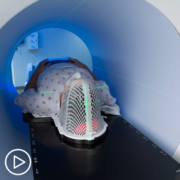What Factors Impact Head and Neck Cancer Treatment Decisions?
What Factors Impact Head and Neck Cancer Treatment Decisions? from Patient Empowerment Network on Vimeo.
Expert Dr. Ari Rosenberg discusses head and neck cancer treatment goals, factors that affect treatment decisions, and his perspective on the value of a second opinion.
Dr. Ari Rosenberg is a medical oncologist and assistant professor of medicine at The University of Chicago Medicine. Learn more about Dr. Rosenberg.
See More From The Pro-Active Head and Neck Cancer Patient Toolkit
Related Programs:

|

|

|
Transcript:
Katherine:
Let’s talk about treatment goals. What are the objectives of treatment?
Dr. Rosenberg:
Yeah, so really, I would put them in sort of two different categories when you think about the goals of treatment. Number one is survival, or, if possible, achieving a cure, right? Cure meaning a treatment that five, 10, 15, 20 years down the road, we don’t see any evidence of recurrence, and trying to give the best opportunity for that.
And living as long as possible for patients, I think, is the number one goal, and we do that with identifying the most effective treatments and support for a given head and neck cancer in a given situation. However, the other very, very important goal of treatment is to optimize long-term function and quality of life. Because in the setting of a very effective treatment against the cancer, we also want patients to have good function. What does that mean function? Speech, swallowing, ability to eat, taste. Have those things that are very, very important for quality of life, and we want to figure out whatever tools we need to achieve both of those goals, and optimize both of those goals, which can be different from patient to patient.
Katherine:
What factors are considered when choosing a treatment?
Dr. Rosenberg:
So, first of all, we think about the diagnosis, right? Is this a squamous cell carcinoma, or is this a different type of cancer, like a salivary gland cancer, or a thyroid cancer, because those are treated very differently. In terms of squamous cell carcinoma, we use the information about whether it’s HPV or non-HPV-related head and neck squamous cell carcinoma, and that has major implications for prognosis, and, therefore, potential treatment or clinical trial options.
We also think about the location of the tumor, and the extent, and the stage. So, is this is a very small tongue cancer, or is this a very large cancer that started in the back of the throat that has already spread to lymph nodes? Both of those, obviously, would be very different treatment options. So, location, and the extent of spread.
Oftentimes, treatment considerations need to take into account – or always, I would say – take into account a patient’s specific factors. How old, other medical problems, other medications, previous treatments that patients have received, are very, very important. And then today, in 2023, we have many targeted molecular characterizations, so we can actually obtain a lot of information from the tumor itself that can also help identify the biological character that can help predict which is the right treatment for a given patient.
So oftentimes, that means looking for genetic mutations, HPV DNA in tumor, or immune markers, such as PDL1, which is an immune marker that we use to predict responsiveness to immunotherapy. These are all datapoints that come into our evaluation to identify what the best, really unique, treatment approach would be for a given patient.
Katherine:
What do you feel is the patient’s role in making treatment decisions?
Dr. Rosenberg:
Very important. You always discuss the situation of the patient, in terms of their cancer. What their diagnosis is, what some of these characteristics are, what the staging is, what the extent of disease is. And then we talk to the patients about what their goals are, what’s most important to them, and figuring out what the treatment paradigms are that help to meet those goals.
And so, it’s very, very important, and it’s very important that patients have a conversation with their oncology treatment team for head and neck cancer about what their goals, what’s most important to them, and how they can best achieve those goals in the context of head and neck cancer treatment planning.
Katherine:
Yeah. So, it sounds like there’s a lot of factors taken into consideration then.
Dr. Rosenberg:
Definitely.
Katherine:
I’d like to turn to self-advocacy now. If a patient is feeling uncomfortable with the direction of their treatment plan or their care, do you think they should consider a second opinion, or even consult a specialist?
Dr. Rosenberg:
So, yes. I think, especially if a patient is feeling uncomfortable, it is always a good idea to get a second opinion, and to have another fresh set of eyes evaluate the case. Whether it means that that second opinion will reinforce the plan and give the patient more confidence in the plan that was proposed, or whether it means a potentially alternative plan that may be suggested for different reasons. And that allows the patient to have the autonomy and the facility to be able to help figure out which of the treatment team that is most appropriate for them.
At the end of the day, head and neck cancer doctors want what’s best for patients. They want patients to do well, and that means that supporting patients in whatever – they want to do what will be best for them. I think all of us want that for patients. I think that’s definitely the case.
Katherine:
Yeah. What would you say to patients who may be nervous about maybe hurting their doctor’s feelings by getting a second opinion? Can you reassure them in some way?
Dr. Rosenberg:
Yeah. I mean, I would say that you shouldn’t worry about that, because doctors really do truly want their patients to do well. We go to this field because we want to help people, we want to help patients do better. And oftentimes, that means second opinion. So, I could tell you that I’m highly supportive of that.
And the other thing I’ll just say is that head and neck cancer is a really specialized type of cancer, in terms of cancer treatment. And so, it is a good idea, in my view, and in my opinion, to be evaluated by an experienced head and neck cancer treatment team. One of the treatment teams that tends to see a very large volume, has a lot of experience treating head and neck cancer because that experience, I do think, is important for optimizing treatment outcomes.





